Comprehensive Analysis of Sasol's Global Business Environment Report
VerifiedAdded on 2022/11/23
|13
|4376
|397
Report
AI Summary
This report provides a comprehensive analysis of Sasol's global business environment. It begins with an introduction to globalization and its impact on business, followed by an analysis of key factors driving global commerce, including cost, market, environment, and competition. The report then examines the strategic challenges Sasol faces when operating globally, supported by specific examples, and evaluates the influences of globalization on organizational governance, leadership, culture, structure, and functions using the McKinsey 7S model. The report also assesses the impact of ethical and sustainable globalization on organizational functions and explores different approaches to decision-making in a global context, including routes to internationalization and associated barriers. The report uses PESTLE analysis to identify external factors influencing Sasol and concludes with a summary of key findings and references.
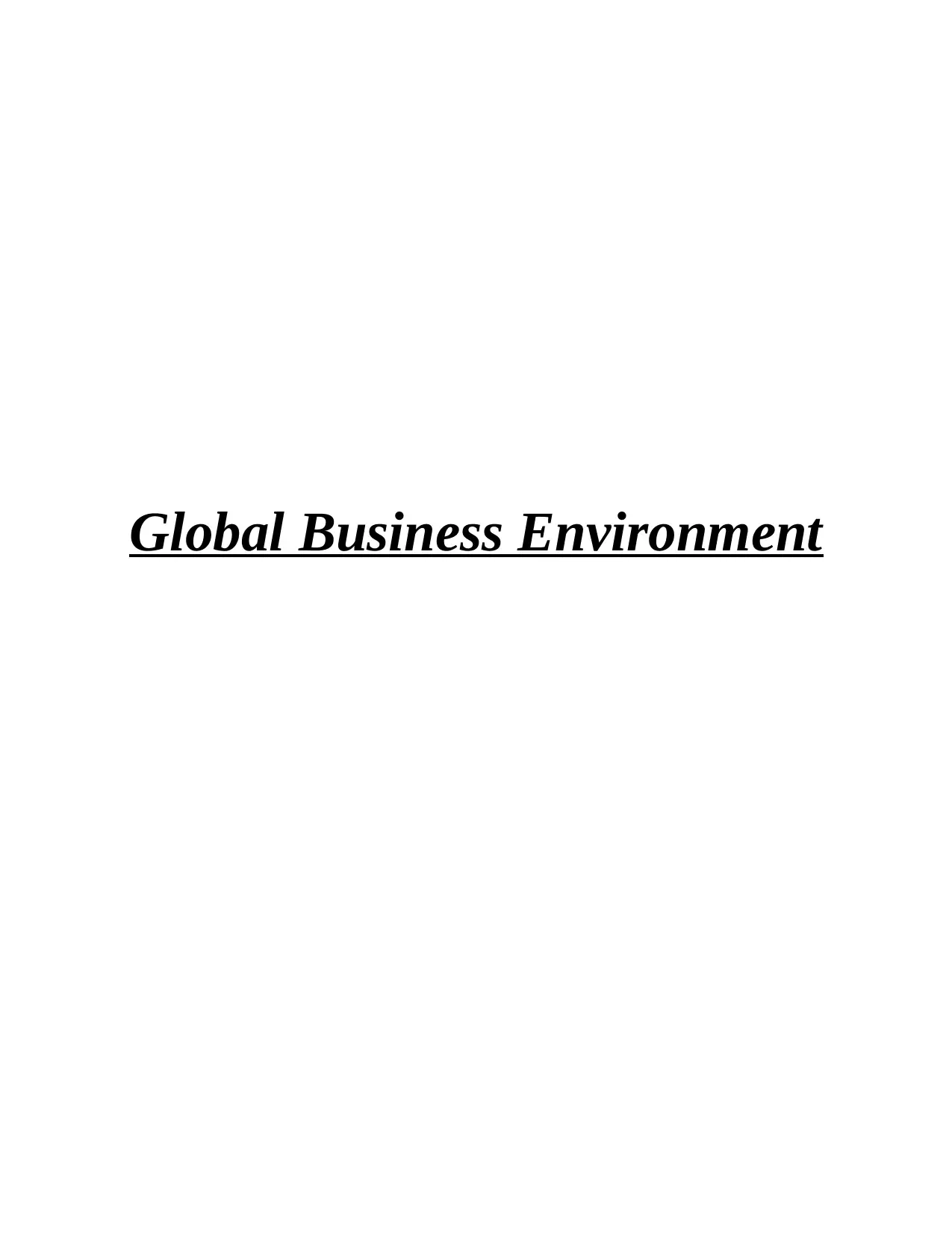
Global Business Environment
Paraphrase This Document
Need a fresh take? Get an instant paraphrase of this document with our AI Paraphraser
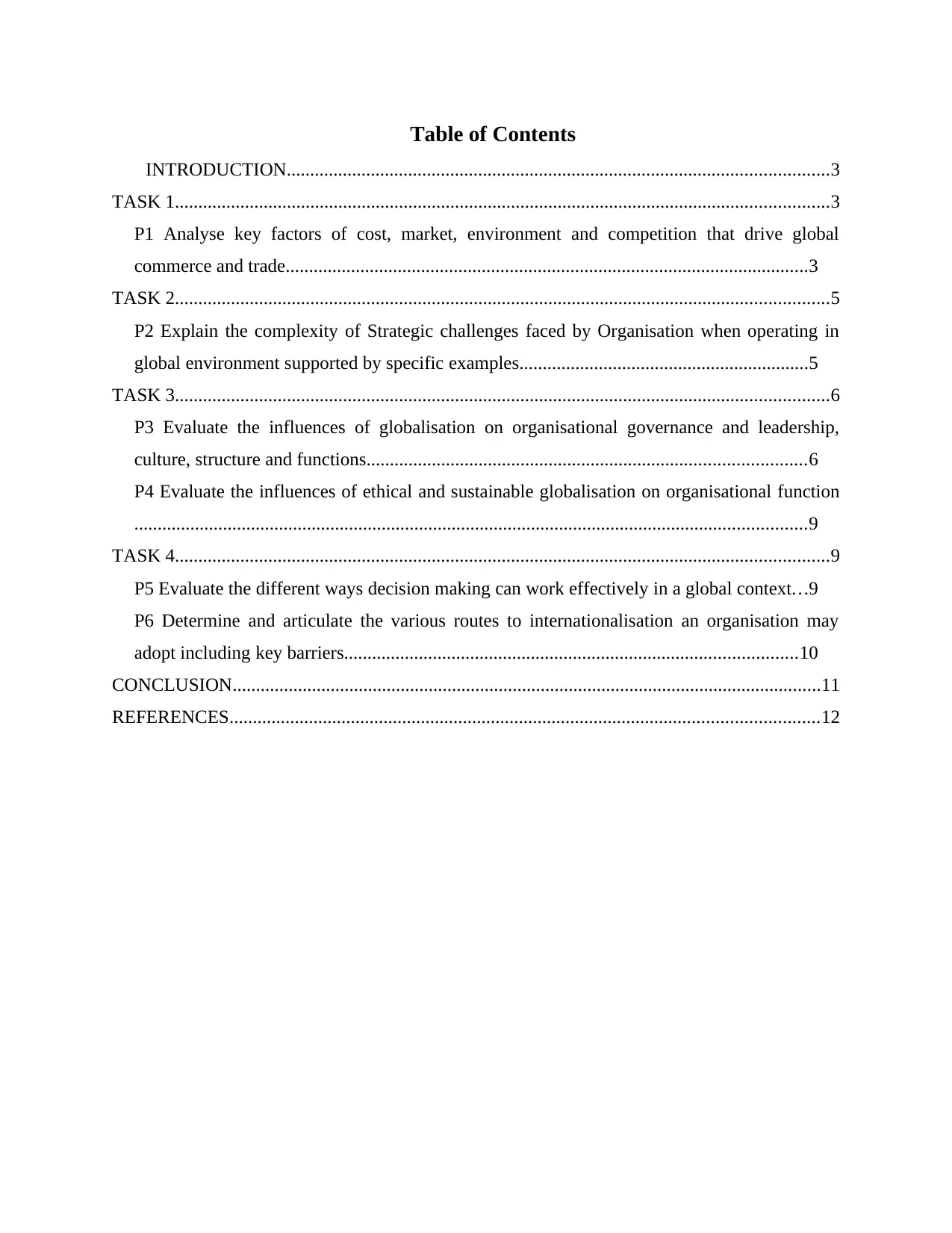
Table of Contents
INTRODUCTION....................................................................................................................3
TASK 1............................................................................................................................................3
P1 Analyse key factors of cost, market, environment and competition that drive global
commerce and trade................................................................................................................3
TASK 2............................................................................................................................................5
P2 Explain the complexity of Strategic challenges faced by Organisation when operating in
global environment supported by specific examples..............................................................5
TASK 3............................................................................................................................................6
P3 Evaluate the influences of globalisation on organisational governance and leadership,
culture, structure and functions..............................................................................................6
P4 Evaluate the influences of ethical and sustainable globalisation on organisational function
................................................................................................................................................9
TASK 4............................................................................................................................................9
P5 Evaluate the different ways decision making can work effectively in a global context...9
P6 Determine and articulate the various routes to internationalisation an organisation may
adopt including key barriers.................................................................................................10
CONCLUSION..............................................................................................................................11
REFERENCES..............................................................................................................................12
INTRODUCTION....................................................................................................................3
TASK 1............................................................................................................................................3
P1 Analyse key factors of cost, market, environment and competition that drive global
commerce and trade................................................................................................................3
TASK 2............................................................................................................................................5
P2 Explain the complexity of Strategic challenges faced by Organisation when operating in
global environment supported by specific examples..............................................................5
TASK 3............................................................................................................................................6
P3 Evaluate the influences of globalisation on organisational governance and leadership,
culture, structure and functions..............................................................................................6
P4 Evaluate the influences of ethical and sustainable globalisation on organisational function
................................................................................................................................................9
TASK 4............................................................................................................................................9
P5 Evaluate the different ways decision making can work effectively in a global context...9
P6 Determine and articulate the various routes to internationalisation an organisation may
adopt including key barriers.................................................................................................10
CONCLUSION..............................................................................................................................11
REFERENCES..............................................................................................................................12
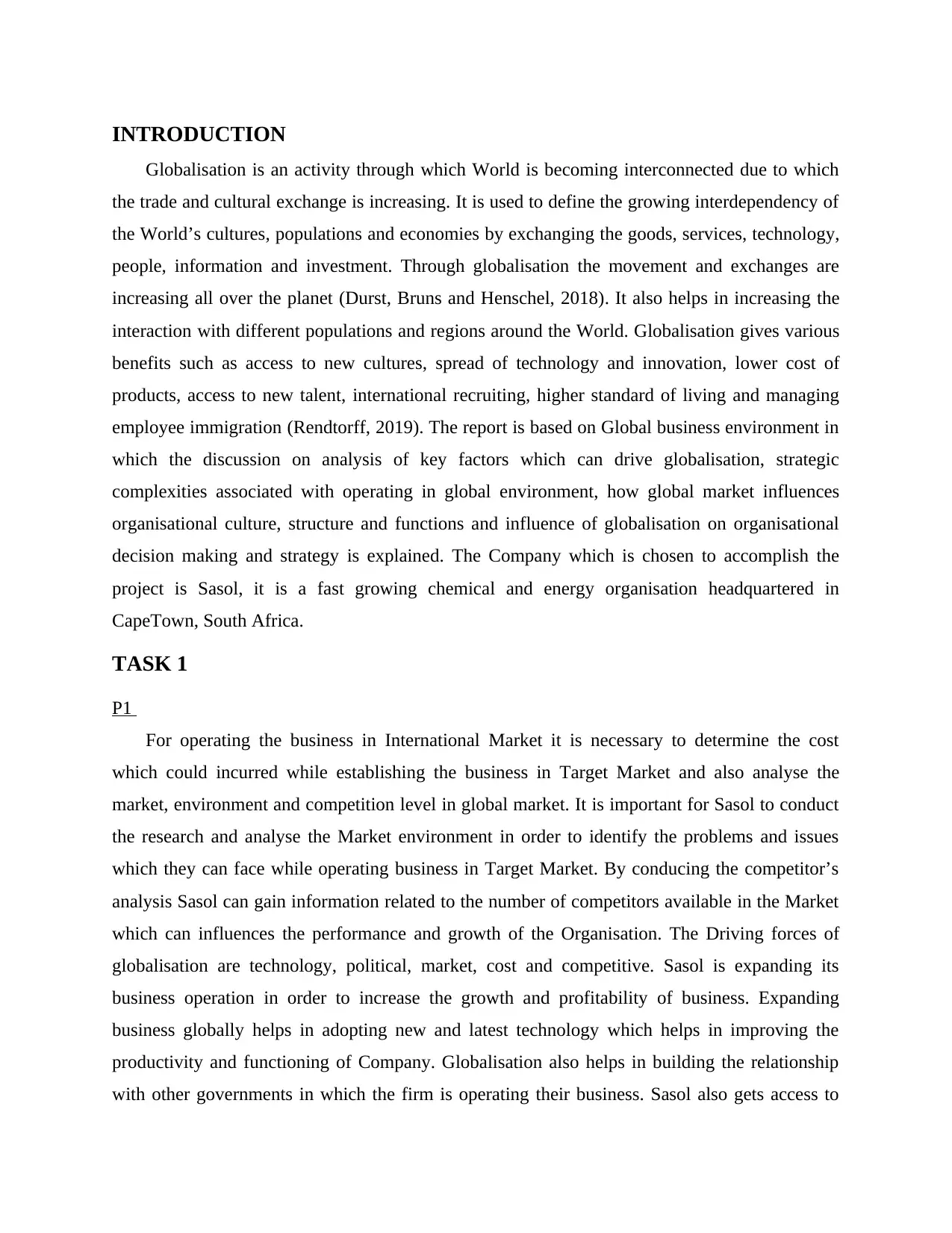
INTRODUCTION
Globalisation is an activity through which World is becoming interconnected due to which
the trade and cultural exchange is increasing. It is used to define the growing interdependency of
the World’s cultures, populations and economies by exchanging the goods, services, technology,
people, information and investment. Through globalisation the movement and exchanges are
increasing all over the planet (Durst, Bruns and Henschel, 2018). It also helps in increasing the
interaction with different populations and regions around the World. Globalisation gives various
benefits such as access to new cultures, spread of technology and innovation, lower cost of
products, access to new talent, international recruiting, higher standard of living and managing
employee immigration (Rendtorff, 2019). The report is based on Global business environment in
which the discussion on analysis of key factors which can drive globalisation, strategic
complexities associated with operating in global environment, how global market influences
organisational culture, structure and functions and influence of globalisation on organisational
decision making and strategy is explained. The Company which is chosen to accomplish the
project is Sasol, it is a fast growing chemical and energy organisation headquartered in
CapeTown, South Africa.
TASK 1
P1
For operating the business in International Market it is necessary to determine the cost
which could incurred while establishing the business in Target Market and also analyse the
market, environment and competition level in global market. It is important for Sasol to conduct
the research and analyse the Market environment in order to identify the problems and issues
which they can face while operating business in Target Market. By conducing the competitor’s
analysis Sasol can gain information related to the number of competitors available in the Market
which can influences the performance and growth of the Organisation. The Driving forces of
globalisation are technology, political, market, cost and competitive. Sasol is expanding its
business operation in order to increase the growth and profitability of business. Expanding
business globally helps in adopting new and latest technology which helps in improving the
productivity and functioning of Company. Globalisation also helps in building the relationship
with other governments in which the firm is operating their business. Sasol also gets access to
Globalisation is an activity through which World is becoming interconnected due to which
the trade and cultural exchange is increasing. It is used to define the growing interdependency of
the World’s cultures, populations and economies by exchanging the goods, services, technology,
people, information and investment. Through globalisation the movement and exchanges are
increasing all over the planet (Durst, Bruns and Henschel, 2018). It also helps in increasing the
interaction with different populations and regions around the World. Globalisation gives various
benefits such as access to new cultures, spread of technology and innovation, lower cost of
products, access to new talent, international recruiting, higher standard of living and managing
employee immigration (Rendtorff, 2019). The report is based on Global business environment in
which the discussion on analysis of key factors which can drive globalisation, strategic
complexities associated with operating in global environment, how global market influences
organisational culture, structure and functions and influence of globalisation on organisational
decision making and strategy is explained. The Company which is chosen to accomplish the
project is Sasol, it is a fast growing chemical and energy organisation headquartered in
CapeTown, South Africa.
TASK 1
P1
For operating the business in International Market it is necessary to determine the cost
which could incurred while establishing the business in Target Market and also analyse the
market, environment and competition level in global market. It is important for Sasol to conduct
the research and analyse the Market environment in order to identify the problems and issues
which they can face while operating business in Target Market. By conducing the competitor’s
analysis Sasol can gain information related to the number of competitors available in the Market
which can influences the performance and growth of the Organisation. The Driving forces of
globalisation are technology, political, market, cost and competitive. Sasol is expanding its
business operation in order to increase the growth and profitability of business. Expanding
business globally helps in adopting new and latest technology which helps in improving the
productivity and functioning of Company. Globalisation also helps in building the relationship
with other governments in which the firm is operating their business. Sasol also gets access to
⊘ This is a preview!⊘
Do you want full access?
Subscribe today to unlock all pages.

Trusted by 1+ million students worldwide
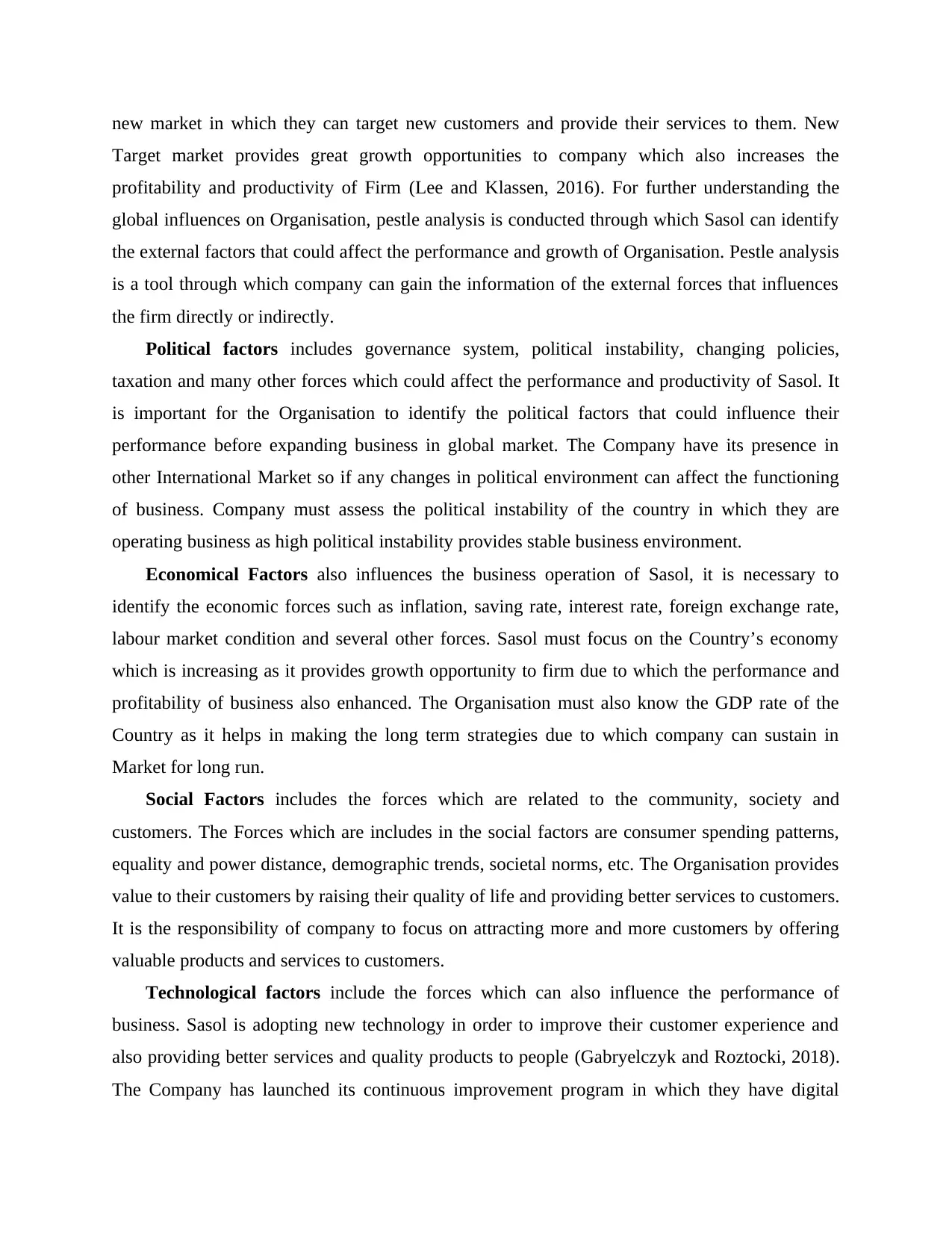
new market in which they can target new customers and provide their services to them. New
Target market provides great growth opportunities to company which also increases the
profitability and productivity of Firm (Lee and Klassen, 2016). For further understanding the
global influences on Organisation, pestle analysis is conducted through which Sasol can identify
the external factors that could affect the performance and growth of Organisation. Pestle analysis
is a tool through which company can gain the information of the external forces that influences
the firm directly or indirectly.
Political factors includes governance system, political instability, changing policies,
taxation and many other forces which could affect the performance and productivity of Sasol. It
is important for the Organisation to identify the political factors that could influence their
performance before expanding business in global market. The Company have its presence in
other International Market so if any changes in political environment can affect the functioning
of business. Company must assess the political instability of the country in which they are
operating business as high political instability provides stable business environment.
Economical Factors also influences the business operation of Sasol, it is necessary to
identify the economic forces such as inflation, saving rate, interest rate, foreign exchange rate,
labour market condition and several other forces. Sasol must focus on the Country’s economy
which is increasing as it provides growth opportunity to firm due to which the performance and
profitability of business also enhanced. The Organisation must also know the GDP rate of the
Country as it helps in making the long term strategies due to which company can sustain in
Market for long run.
Social Factors includes the forces which are related to the community, society and
customers. The Forces which are includes in the social factors are consumer spending patterns,
equality and power distance, demographic trends, societal norms, etc. The Organisation provides
value to their customers by raising their quality of life and providing better services to customers.
It is the responsibility of company to focus on attracting more and more customers by offering
valuable products and services to customers.
Technological factors include the forces which can also influence the performance of
business. Sasol is adopting new technology in order to improve their customer experience and
also providing better services and quality products to people (Gabryelczyk and Roztocki, 2018).
The Company has launched its continuous improvement program in which they have digital
Target market provides great growth opportunities to company which also increases the
profitability and productivity of Firm (Lee and Klassen, 2016). For further understanding the
global influences on Organisation, pestle analysis is conducted through which Sasol can identify
the external factors that could affect the performance and growth of Organisation. Pestle analysis
is a tool through which company can gain the information of the external forces that influences
the firm directly or indirectly.
Political factors includes governance system, political instability, changing policies,
taxation and many other forces which could affect the performance and productivity of Sasol. It
is important for the Organisation to identify the political factors that could influence their
performance before expanding business in global market. The Company have its presence in
other International Market so if any changes in political environment can affect the functioning
of business. Company must assess the political instability of the country in which they are
operating business as high political instability provides stable business environment.
Economical Factors also influences the business operation of Sasol, it is necessary to
identify the economic forces such as inflation, saving rate, interest rate, foreign exchange rate,
labour market condition and several other forces. Sasol must focus on the Country’s economy
which is increasing as it provides growth opportunity to firm due to which the performance and
profitability of business also enhanced. The Organisation must also know the GDP rate of the
Country as it helps in making the long term strategies due to which company can sustain in
Market for long run.
Social Factors includes the forces which are related to the community, society and
customers. The Forces which are includes in the social factors are consumer spending patterns,
equality and power distance, demographic trends, societal norms, etc. The Organisation provides
value to their customers by raising their quality of life and providing better services to customers.
It is the responsibility of company to focus on attracting more and more customers by offering
valuable products and services to customers.
Technological factors include the forces which can also influence the performance of
business. Sasol is adopting new technology in order to improve their customer experience and
also providing better services and quality products to people (Gabryelczyk and Roztocki, 2018).
The Company has launched its continuous improvement program in which they have digital
Paraphrase This Document
Need a fresh take? Get an instant paraphrase of this document with our AI Paraphraser
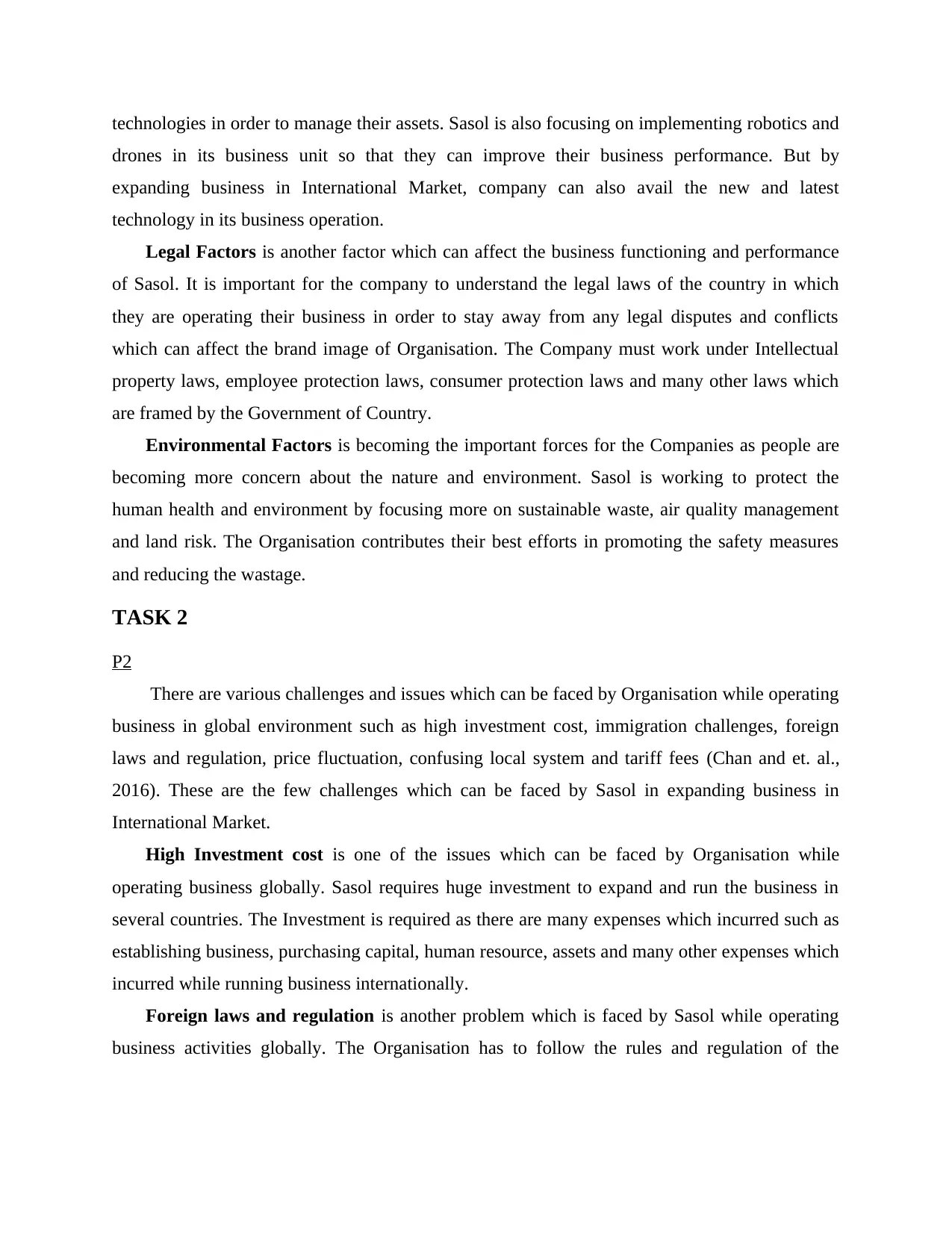
technologies in order to manage their assets. Sasol is also focusing on implementing robotics and
drones in its business unit so that they can improve their business performance. But by
expanding business in International Market, company can also avail the new and latest
technology in its business operation.
Legal Factors is another factor which can affect the business functioning and performance
of Sasol. It is important for the company to understand the legal laws of the country in which
they are operating their business in order to stay away from any legal disputes and conflicts
which can affect the brand image of Organisation. The Company must work under Intellectual
property laws, employee protection laws, consumer protection laws and many other laws which
are framed by the Government of Country.
Environmental Factors is becoming the important forces for the Companies as people are
becoming more concern about the nature and environment. Sasol is working to protect the
human health and environment by focusing more on sustainable waste, air quality management
and land risk. The Organisation contributes their best efforts in promoting the safety measures
and reducing the wastage.
TASK 2
P2
There are various challenges and issues which can be faced by Organisation while operating
business in global environment such as high investment cost, immigration challenges, foreign
laws and regulation, price fluctuation, confusing local system and tariff fees (Chan and et. al.,
2016). These are the few challenges which can be faced by Sasol in expanding business in
International Market.
High Investment cost is one of the issues which can be faced by Organisation while
operating business globally. Sasol requires huge investment to expand and run the business in
several countries. The Investment is required as there are many expenses which incurred such as
establishing business, purchasing capital, human resource, assets and many other expenses which
incurred while running business internationally.
Foreign laws and regulation is another problem which is faced by Sasol while operating
business activities globally. The Organisation has to follow the rules and regulation of the
drones in its business unit so that they can improve their business performance. But by
expanding business in International Market, company can also avail the new and latest
technology in its business operation.
Legal Factors is another factor which can affect the business functioning and performance
of Sasol. It is important for the company to understand the legal laws of the country in which
they are operating their business in order to stay away from any legal disputes and conflicts
which can affect the brand image of Organisation. The Company must work under Intellectual
property laws, employee protection laws, consumer protection laws and many other laws which
are framed by the Government of Country.
Environmental Factors is becoming the important forces for the Companies as people are
becoming more concern about the nature and environment. Sasol is working to protect the
human health and environment by focusing more on sustainable waste, air quality management
and land risk. The Organisation contributes their best efforts in promoting the safety measures
and reducing the wastage.
TASK 2
P2
There are various challenges and issues which can be faced by Organisation while operating
business in global environment such as high investment cost, immigration challenges, foreign
laws and regulation, price fluctuation, confusing local system and tariff fees (Chan and et. al.,
2016). These are the few challenges which can be faced by Sasol in expanding business in
International Market.
High Investment cost is one of the issues which can be faced by Organisation while
operating business globally. Sasol requires huge investment to expand and run the business in
several countries. The Investment is required as there are many expenses which incurred such as
establishing business, purchasing capital, human resource, assets and many other expenses which
incurred while running business internationally.
Foreign laws and regulation is another problem which is faced by Sasol while operating
business activities globally. The Organisation has to follow the rules and regulation of the
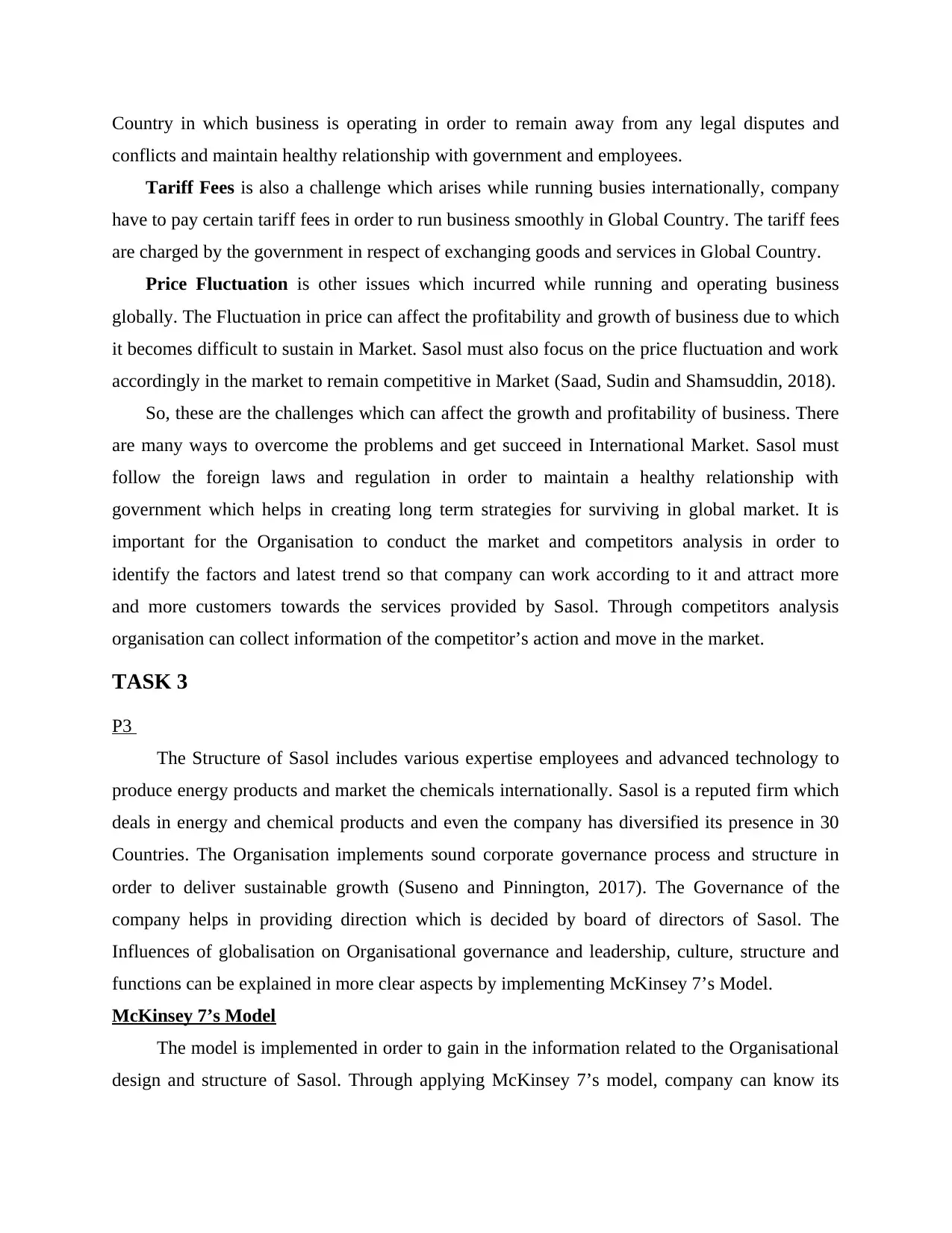
Country in which business is operating in order to remain away from any legal disputes and
conflicts and maintain healthy relationship with government and employees.
Tariff Fees is also a challenge which arises while running busies internationally, company
have to pay certain tariff fees in order to run business smoothly in Global Country. The tariff fees
are charged by the government in respect of exchanging goods and services in Global Country.
Price Fluctuation is other issues which incurred while running and operating business
globally. The Fluctuation in price can affect the profitability and growth of business due to which
it becomes difficult to sustain in Market. Sasol must also focus on the price fluctuation and work
accordingly in the market to remain competitive in Market (Saad, Sudin and Shamsuddin, 2018).
So, these are the challenges which can affect the growth and profitability of business. There
are many ways to overcome the problems and get succeed in International Market. Sasol must
follow the foreign laws and regulation in order to maintain a healthy relationship with
government which helps in creating long term strategies for surviving in global market. It is
important for the Organisation to conduct the market and competitors analysis in order to
identify the factors and latest trend so that company can work according to it and attract more
and more customers towards the services provided by Sasol. Through competitors analysis
organisation can collect information of the competitor’s action and move in the market.
TASK 3
P3
The Structure of Sasol includes various expertise employees and advanced technology to
produce energy products and market the chemicals internationally. Sasol is a reputed firm which
deals in energy and chemical products and even the company has diversified its presence in 30
Countries. The Organisation implements sound corporate governance process and structure in
order to deliver sustainable growth (Suseno and Pinnington, 2017). The Governance of the
company helps in providing direction which is decided by board of directors of Sasol. The
Influences of globalisation on Organisational governance and leadership, culture, structure and
functions can be explained in more clear aspects by implementing McKinsey 7’s Model.
McKinsey 7’s Model
The model is implemented in order to gain in the information related to the Organisational
design and structure of Sasol. Through applying McKinsey 7’s model, company can know its
conflicts and maintain healthy relationship with government and employees.
Tariff Fees is also a challenge which arises while running busies internationally, company
have to pay certain tariff fees in order to run business smoothly in Global Country. The tariff fees
are charged by the government in respect of exchanging goods and services in Global Country.
Price Fluctuation is other issues which incurred while running and operating business
globally. The Fluctuation in price can affect the profitability and growth of business due to which
it becomes difficult to sustain in Market. Sasol must also focus on the price fluctuation and work
accordingly in the market to remain competitive in Market (Saad, Sudin and Shamsuddin, 2018).
So, these are the challenges which can affect the growth and profitability of business. There
are many ways to overcome the problems and get succeed in International Market. Sasol must
follow the foreign laws and regulation in order to maintain a healthy relationship with
government which helps in creating long term strategies for surviving in global market. It is
important for the Organisation to conduct the market and competitors analysis in order to
identify the factors and latest trend so that company can work according to it and attract more
and more customers towards the services provided by Sasol. Through competitors analysis
organisation can collect information of the competitor’s action and move in the market.
TASK 3
P3
The Structure of Sasol includes various expertise employees and advanced technology to
produce energy products and market the chemicals internationally. Sasol is a reputed firm which
deals in energy and chemical products and even the company has diversified its presence in 30
Countries. The Organisation implements sound corporate governance process and structure in
order to deliver sustainable growth (Suseno and Pinnington, 2017). The Governance of the
company helps in providing direction which is decided by board of directors of Sasol. The
Influences of globalisation on Organisational governance and leadership, culture, structure and
functions can be explained in more clear aspects by implementing McKinsey 7’s Model.
McKinsey 7’s Model
The model is implemented in order to gain in the information related to the Organisational
design and structure of Sasol. Through applying McKinsey 7’s model, company can know its
⊘ This is a preview!⊘
Do you want full access?
Subscribe today to unlock all pages.

Trusted by 1+ million students worldwide
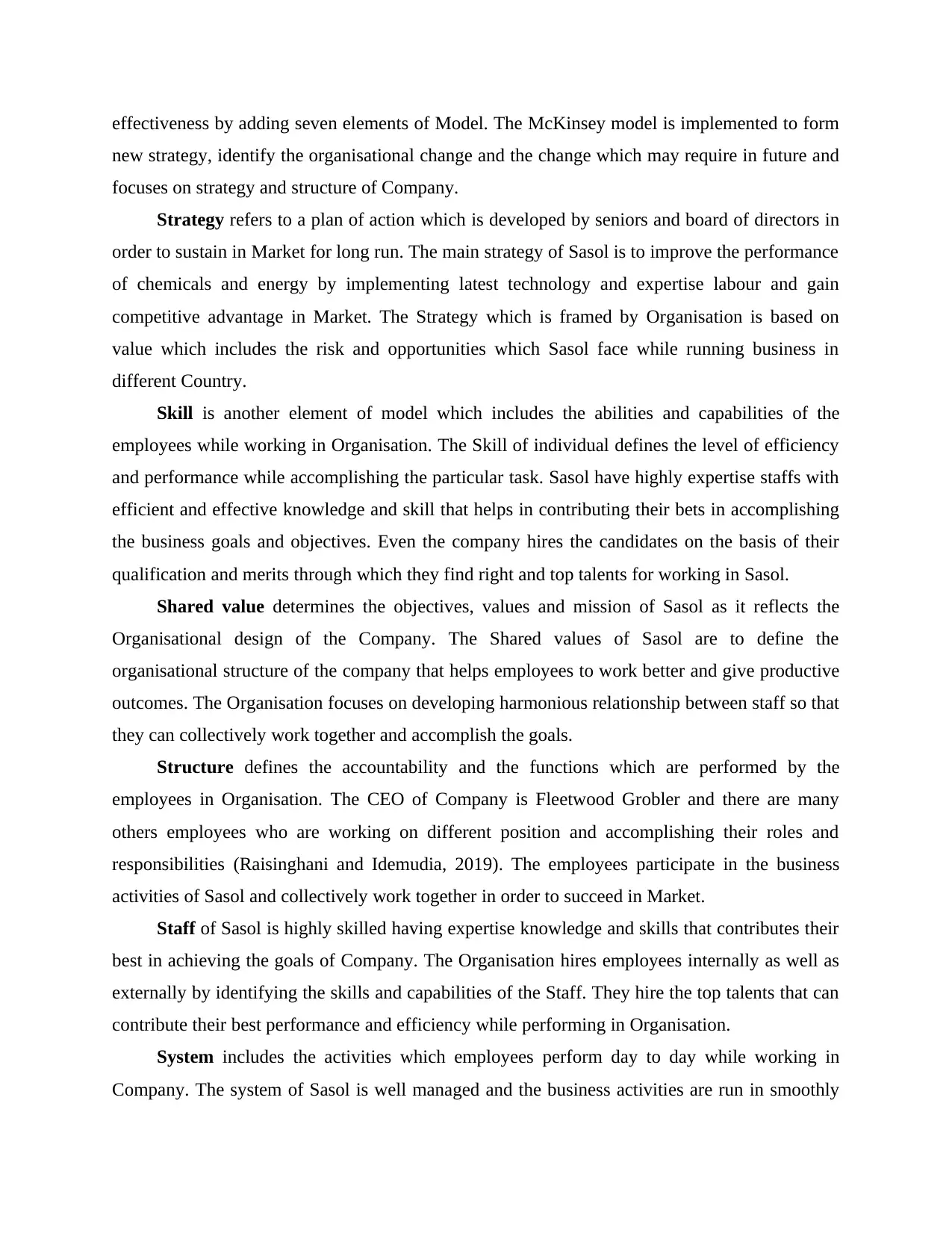
effectiveness by adding seven elements of Model. The McKinsey model is implemented to form
new strategy, identify the organisational change and the change which may require in future and
focuses on strategy and structure of Company.
Strategy refers to a plan of action which is developed by seniors and board of directors in
order to sustain in Market for long run. The main strategy of Sasol is to improve the performance
of chemicals and energy by implementing latest technology and expertise labour and gain
competitive advantage in Market. The Strategy which is framed by Organisation is based on
value which includes the risk and opportunities which Sasol face while running business in
different Country.
Skill is another element of model which includes the abilities and capabilities of the
employees while working in Organisation. The Skill of individual defines the level of efficiency
and performance while accomplishing the particular task. Sasol have highly expertise staffs with
efficient and effective knowledge and skill that helps in contributing their bets in accomplishing
the business goals and objectives. Even the company hires the candidates on the basis of their
qualification and merits through which they find right and top talents for working in Sasol.
Shared value determines the objectives, values and mission of Sasol as it reflects the
Organisational design of the Company. The Shared values of Sasol are to define the
organisational structure of the company that helps employees to work better and give productive
outcomes. The Organisation focuses on developing harmonious relationship between staff so that
they can collectively work together and accomplish the goals.
Structure defines the accountability and the functions which are performed by the
employees in Organisation. The CEO of Company is Fleetwood Grobler and there are many
others employees who are working on different position and accomplishing their roles and
responsibilities (Raisinghani and Idemudia, 2019). The employees participate in the business
activities of Sasol and collectively work together in order to succeed in Market.
Staff of Sasol is highly skilled having expertise knowledge and skills that contributes their
best in achieving the goals of Company. The Organisation hires employees internally as well as
externally by identifying the skills and capabilities of the Staff. They hire the top talents that can
contribute their best performance and efficiency while performing in Organisation.
System includes the activities which employees perform day to day while working in
Company. The system of Sasol is well managed and the business activities are run in smoothly
new strategy, identify the organisational change and the change which may require in future and
focuses on strategy and structure of Company.
Strategy refers to a plan of action which is developed by seniors and board of directors in
order to sustain in Market for long run. The main strategy of Sasol is to improve the performance
of chemicals and energy by implementing latest technology and expertise labour and gain
competitive advantage in Market. The Strategy which is framed by Organisation is based on
value which includes the risk and opportunities which Sasol face while running business in
different Country.
Skill is another element of model which includes the abilities and capabilities of the
employees while working in Organisation. The Skill of individual defines the level of efficiency
and performance while accomplishing the particular task. Sasol have highly expertise staffs with
efficient and effective knowledge and skill that helps in contributing their bets in accomplishing
the business goals and objectives. Even the company hires the candidates on the basis of their
qualification and merits through which they find right and top talents for working in Sasol.
Shared value determines the objectives, values and mission of Sasol as it reflects the
Organisational design of the Company. The Shared values of Sasol are to define the
organisational structure of the company that helps employees to work better and give productive
outcomes. The Organisation focuses on developing harmonious relationship between staff so that
they can collectively work together and accomplish the goals.
Structure defines the accountability and the functions which are performed by the
employees in Organisation. The CEO of Company is Fleetwood Grobler and there are many
others employees who are working on different position and accomplishing their roles and
responsibilities (Raisinghani and Idemudia, 2019). The employees participate in the business
activities of Sasol and collectively work together in order to succeed in Market.
Staff of Sasol is highly skilled having expertise knowledge and skills that contributes their
best in achieving the goals of Company. The Organisation hires employees internally as well as
externally by identifying the skills and capabilities of the Staff. They hire the top talents that can
contribute their best performance and efficiency while performing in Organisation.
System includes the activities which employees perform day to day while working in
Company. The system of Sasol is well managed and the business activities are run in smoothly
Paraphrase This Document
Need a fresh take? Get an instant paraphrase of this document with our AI Paraphraser
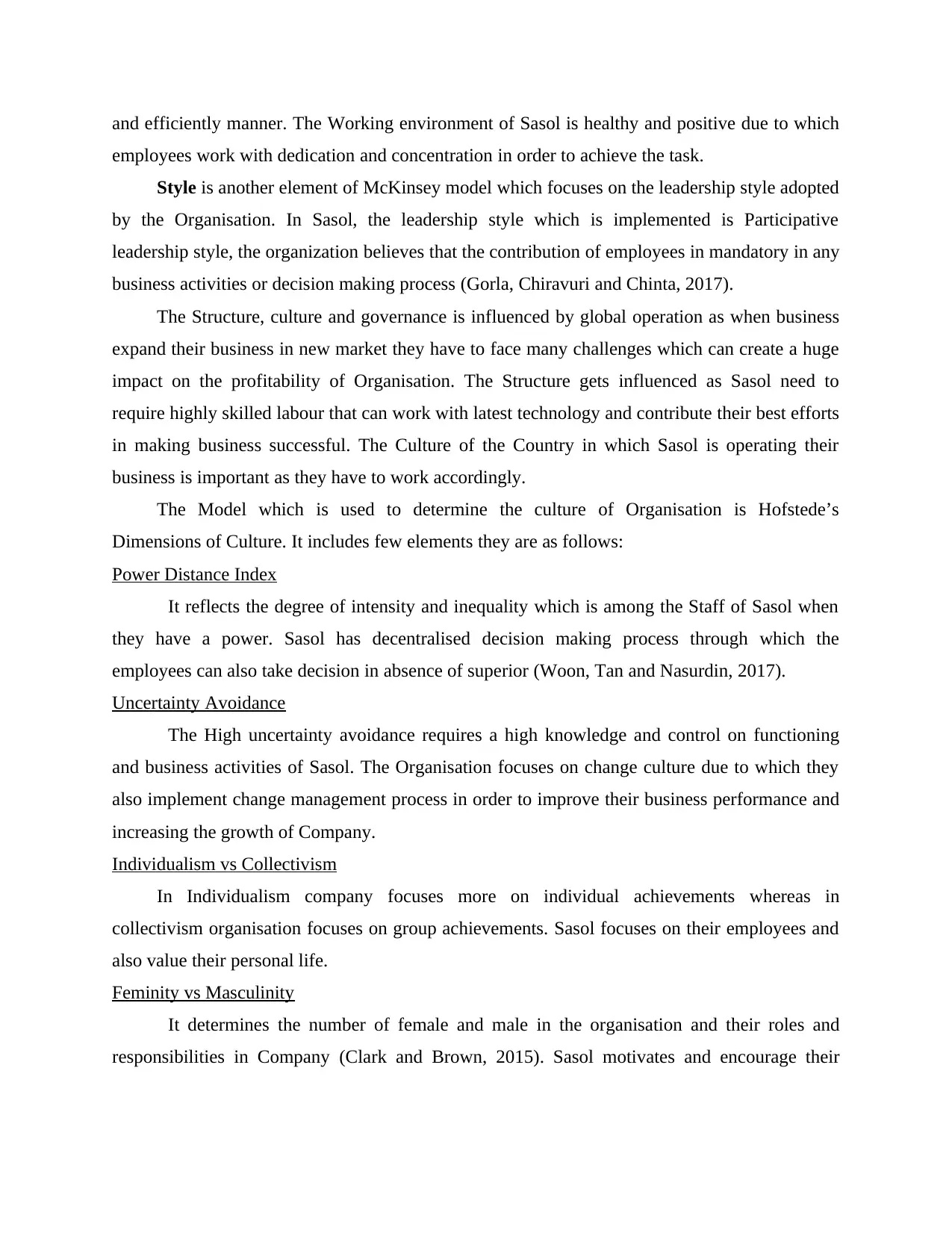
and efficiently manner. The Working environment of Sasol is healthy and positive due to which
employees work with dedication and concentration in order to achieve the task.
Style is another element of McKinsey model which focuses on the leadership style adopted
by the Organisation. In Sasol, the leadership style which is implemented is Participative
leadership style, the organization believes that the contribution of employees in mandatory in any
business activities or decision making process (Gorla, Chiravuri and Chinta, 2017).
The Structure, culture and governance is influenced by global operation as when business
expand their business in new market they have to face many challenges which can create a huge
impact on the profitability of Organisation. The Structure gets influenced as Sasol need to
require highly skilled labour that can work with latest technology and contribute their best efforts
in making business successful. The Culture of the Country in which Sasol is operating their
business is important as they have to work accordingly.
The Model which is used to determine the culture of Organisation is Hofstede’s
Dimensions of Culture. It includes few elements they are as follows:
Power Distance Index
It reflects the degree of intensity and inequality which is among the Staff of Sasol when
they have a power. Sasol has decentralised decision making process through which the
employees can also take decision in absence of superior (Woon, Tan and Nasurdin, 2017).
Uncertainty Avoidance
The High uncertainty avoidance requires a high knowledge and control on functioning
and business activities of Sasol. The Organisation focuses on change culture due to which they
also implement change management process in order to improve their business performance and
increasing the growth of Company.
Individualism vs Collectivism
In Individualism company focuses more on individual achievements whereas in
collectivism organisation focuses on group achievements. Sasol focuses on their employees and
also value their personal life.
Feminity vs Masculinity
It determines the number of female and male in the organisation and their roles and
responsibilities in Company (Clark and Brown, 2015). Sasol motivates and encourage their
employees work with dedication and concentration in order to achieve the task.
Style is another element of McKinsey model which focuses on the leadership style adopted
by the Organisation. In Sasol, the leadership style which is implemented is Participative
leadership style, the organization believes that the contribution of employees in mandatory in any
business activities or decision making process (Gorla, Chiravuri and Chinta, 2017).
The Structure, culture and governance is influenced by global operation as when business
expand their business in new market they have to face many challenges which can create a huge
impact on the profitability of Organisation. The Structure gets influenced as Sasol need to
require highly skilled labour that can work with latest technology and contribute their best efforts
in making business successful. The Culture of the Country in which Sasol is operating their
business is important as they have to work accordingly.
The Model which is used to determine the culture of Organisation is Hofstede’s
Dimensions of Culture. It includes few elements they are as follows:
Power Distance Index
It reflects the degree of intensity and inequality which is among the Staff of Sasol when
they have a power. Sasol has decentralised decision making process through which the
employees can also take decision in absence of superior (Woon, Tan and Nasurdin, 2017).
Uncertainty Avoidance
The High uncertainty avoidance requires a high knowledge and control on functioning
and business activities of Sasol. The Organisation focuses on change culture due to which they
also implement change management process in order to improve their business performance and
increasing the growth of Company.
Individualism vs Collectivism
In Individualism company focuses more on individual achievements whereas in
collectivism organisation focuses on group achievements. Sasol focuses on their employees and
also value their personal life.
Feminity vs Masculinity
It determines the number of female and male in the organisation and their roles and
responsibilities in Company (Clark and Brown, 2015). Sasol motivates and encourage their
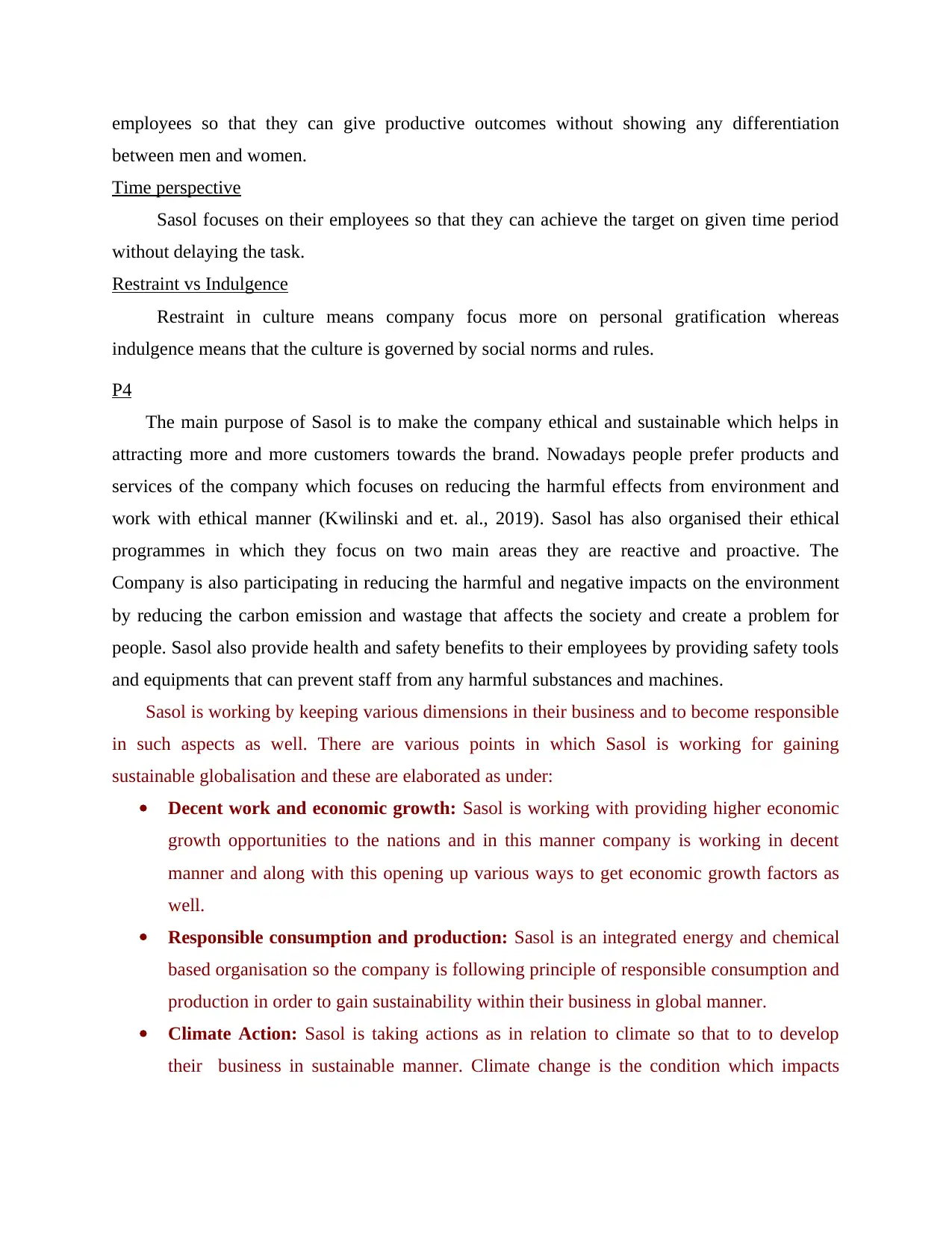
employees so that they can give productive outcomes without showing any differentiation
between men and women.
Time perspective
Sasol focuses on their employees so that they can achieve the target on given time period
without delaying the task.
Restraint vs Indulgence
Restraint in culture means company focus more on personal gratification whereas
indulgence means that the culture is governed by social norms and rules.
P4
The main purpose of Sasol is to make the company ethical and sustainable which helps in
attracting more and more customers towards the brand. Nowadays people prefer products and
services of the company which focuses on reducing the harmful effects from environment and
work with ethical manner (Kwilinski and et. al., 2019). Sasol has also organised their ethical
programmes in which they focus on two main areas they are reactive and proactive. The
Company is also participating in reducing the harmful and negative impacts on the environment
by reducing the carbon emission and wastage that affects the society and create a problem for
people. Sasol also provide health and safety benefits to their employees by providing safety tools
and equipments that can prevent staff from any harmful substances and machines.
Sasol is working by keeping various dimensions in their business and to become responsible
in such aspects as well. There are various points in which Sasol is working for gaining
sustainable globalisation and these are elaborated as under:
Decent work and economic growth: Sasol is working with providing higher economic
growth opportunities to the nations and in this manner company is working in decent
manner and along with this opening up various ways to get economic growth factors as
well.
Responsible consumption and production: Sasol is an integrated energy and chemical
based organisation so the company is following principle of responsible consumption and
production in order to gain sustainability within their business in global manner.
Climate Action: Sasol is taking actions as in relation to climate so that to to develop
their business in sustainable manner. Climate change is the condition which impacts
between men and women.
Time perspective
Sasol focuses on their employees so that they can achieve the target on given time period
without delaying the task.
Restraint vs Indulgence
Restraint in culture means company focus more on personal gratification whereas
indulgence means that the culture is governed by social norms and rules.
P4
The main purpose of Sasol is to make the company ethical and sustainable which helps in
attracting more and more customers towards the brand. Nowadays people prefer products and
services of the company which focuses on reducing the harmful effects from environment and
work with ethical manner (Kwilinski and et. al., 2019). Sasol has also organised their ethical
programmes in which they focus on two main areas they are reactive and proactive. The
Company is also participating in reducing the harmful and negative impacts on the environment
by reducing the carbon emission and wastage that affects the society and create a problem for
people. Sasol also provide health and safety benefits to their employees by providing safety tools
and equipments that can prevent staff from any harmful substances and machines.
Sasol is working by keeping various dimensions in their business and to become responsible
in such aspects as well. There are various points in which Sasol is working for gaining
sustainable globalisation and these are elaborated as under:
Decent work and economic growth: Sasol is working with providing higher economic
growth opportunities to the nations and in this manner company is working in decent
manner and along with this opening up various ways to get economic growth factors as
well.
Responsible consumption and production: Sasol is an integrated energy and chemical
based organisation so the company is following principle of responsible consumption and
production in order to gain sustainability within their business in global manner.
Climate Action: Sasol is taking actions as in relation to climate so that to to develop
their business in sustainable manner. Climate change is the condition which impacts
⊘ This is a preview!⊘
Do you want full access?
Subscribe today to unlock all pages.

Trusted by 1+ million students worldwide
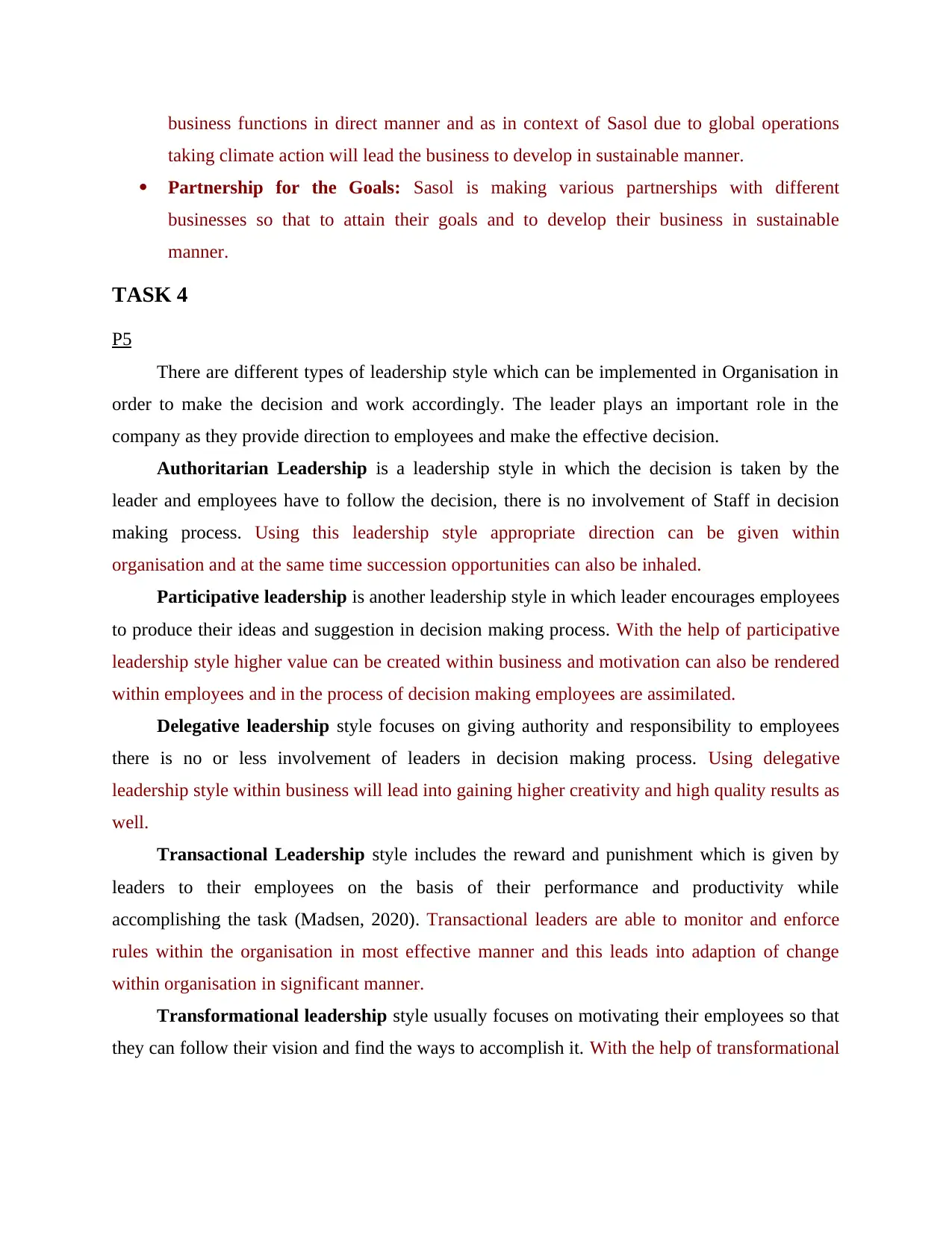
business functions in direct manner and as in context of Sasol due to global operations
taking climate action will lead the business to develop in sustainable manner.
Partnership for the Goals: Sasol is making various partnerships with different
businesses so that to attain their goals and to develop their business in sustainable
manner.
TASK 4
P5
There are different types of leadership style which can be implemented in Organisation in
order to make the decision and work accordingly. The leader plays an important role in the
company as they provide direction to employees and make the effective decision.
Authoritarian Leadership is a leadership style in which the decision is taken by the
leader and employees have to follow the decision, there is no involvement of Staff in decision
making process. Using this leadership style appropriate direction can be given within
organisation and at the same time succession opportunities can also be inhaled.
Participative leadership is another leadership style in which leader encourages employees
to produce their ideas and suggestion in decision making process. With the help of participative
leadership style higher value can be created within business and motivation can also be rendered
within employees and in the process of decision making employees are assimilated.
Delegative leadership style focuses on giving authority and responsibility to employees
there is no or less involvement of leaders in decision making process. Using delegative
leadership style within business will lead into gaining higher creativity and high quality results as
well.
Transactional Leadership style includes the reward and punishment which is given by
leaders to their employees on the basis of their performance and productivity while
accomplishing the task (Madsen, 2020). Transactional leaders are able to monitor and enforce
rules within the organisation in most effective manner and this leads into adaption of change
within organisation in significant manner.
Transformational leadership style usually focuses on motivating their employees so that
they can follow their vision and find the ways to accomplish it. With the help of transformational
taking climate action will lead the business to develop in sustainable manner.
Partnership for the Goals: Sasol is making various partnerships with different
businesses so that to attain their goals and to develop their business in sustainable
manner.
TASK 4
P5
There are different types of leadership style which can be implemented in Organisation in
order to make the decision and work accordingly. The leader plays an important role in the
company as they provide direction to employees and make the effective decision.
Authoritarian Leadership is a leadership style in which the decision is taken by the
leader and employees have to follow the decision, there is no involvement of Staff in decision
making process. Using this leadership style appropriate direction can be given within
organisation and at the same time succession opportunities can also be inhaled.
Participative leadership is another leadership style in which leader encourages employees
to produce their ideas and suggestion in decision making process. With the help of participative
leadership style higher value can be created within business and motivation can also be rendered
within employees and in the process of decision making employees are assimilated.
Delegative leadership style focuses on giving authority and responsibility to employees
there is no or less involvement of leaders in decision making process. Using delegative
leadership style within business will lead into gaining higher creativity and high quality results as
well.
Transactional Leadership style includes the reward and punishment which is given by
leaders to their employees on the basis of their performance and productivity while
accomplishing the task (Madsen, 2020). Transactional leaders are able to monitor and enforce
rules within the organisation in most effective manner and this leads into adaption of change
within organisation in significant manner.
Transformational leadership style usually focuses on motivating their employees so that
they can follow their vision and find the ways to accomplish it. With the help of transformational
Paraphrase This Document
Need a fresh take? Get an instant paraphrase of this document with our AI Paraphraser
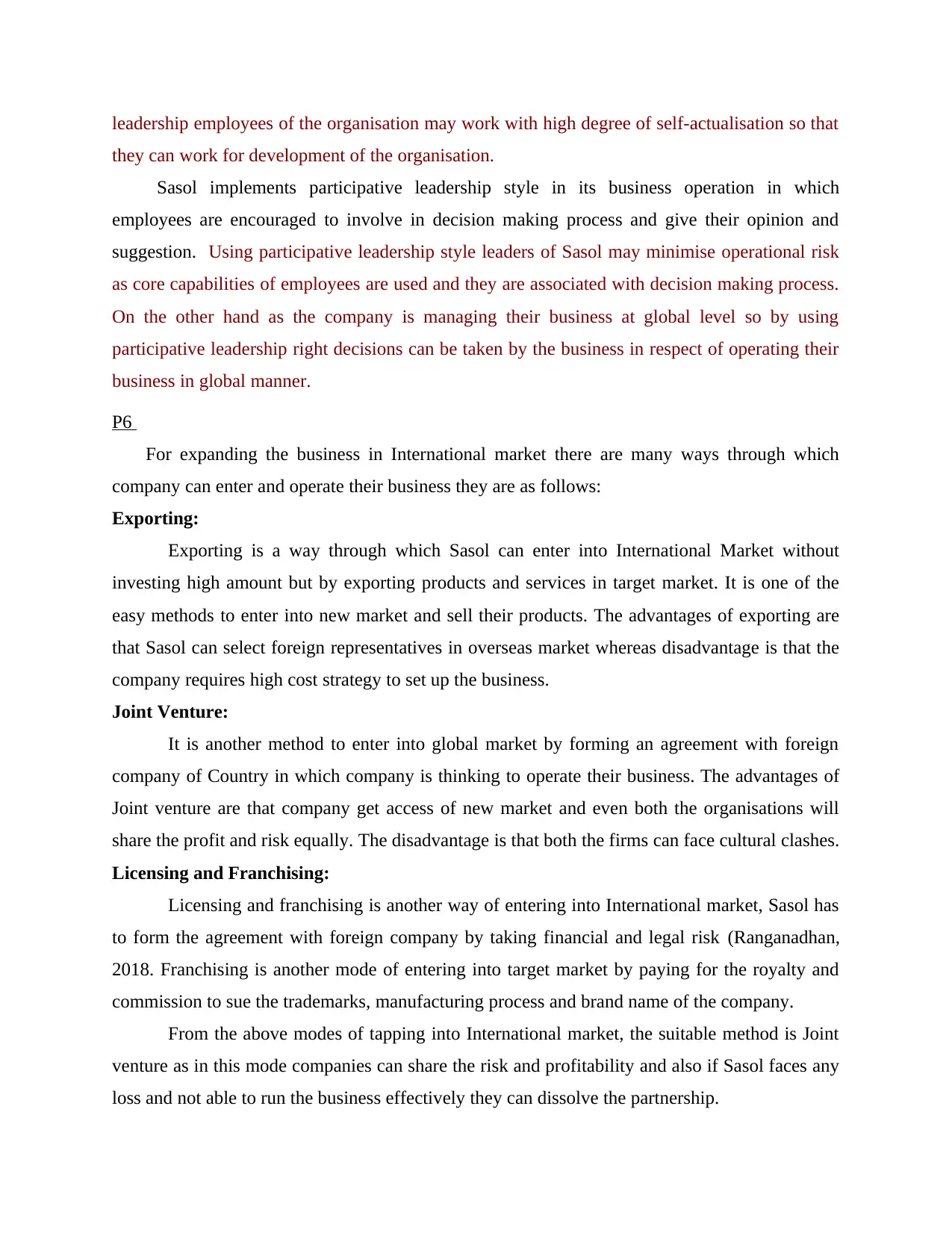
leadership employees of the organisation may work with high degree of self-actualisation so that
they can work for development of the organisation.
Sasol implements participative leadership style in its business operation in which
employees are encouraged to involve in decision making process and give their opinion and
suggestion. Using participative leadership style leaders of Sasol may minimise operational risk
as core capabilities of employees are used and they are associated with decision making process.
On the other hand as the company is managing their business at global level so by using
participative leadership right decisions can be taken by the business in respect of operating their
business in global manner.
P6
For expanding the business in International market there are many ways through which
company can enter and operate their business they are as follows:
Exporting:
Exporting is a way through which Sasol can enter into International Market without
investing high amount but by exporting products and services in target market. It is one of the
easy methods to enter into new market and sell their products. The advantages of exporting are
that Sasol can select foreign representatives in overseas market whereas disadvantage is that the
company requires high cost strategy to set up the business.
Joint Venture:
It is another method to enter into global market by forming an agreement with foreign
company of Country in which company is thinking to operate their business. The advantages of
Joint venture are that company get access of new market and even both the organisations will
share the profit and risk equally. The disadvantage is that both the firms can face cultural clashes.
Licensing and Franchising:
Licensing and franchising is another way of entering into International market, Sasol has
to form the agreement with foreign company by taking financial and legal risk (Ranganadhan,
2018. Franchising is another mode of entering into target market by paying for the royalty and
commission to sue the trademarks, manufacturing process and brand name of the company.
From the above modes of tapping into International market, the suitable method is Joint
venture as in this mode companies can share the risk and profitability and also if Sasol faces any
loss and not able to run the business effectively they can dissolve the partnership.
they can work for development of the organisation.
Sasol implements participative leadership style in its business operation in which
employees are encouraged to involve in decision making process and give their opinion and
suggestion. Using participative leadership style leaders of Sasol may minimise operational risk
as core capabilities of employees are used and they are associated with decision making process.
On the other hand as the company is managing their business at global level so by using
participative leadership right decisions can be taken by the business in respect of operating their
business in global manner.
P6
For expanding the business in International market there are many ways through which
company can enter and operate their business they are as follows:
Exporting:
Exporting is a way through which Sasol can enter into International Market without
investing high amount but by exporting products and services in target market. It is one of the
easy methods to enter into new market and sell their products. The advantages of exporting are
that Sasol can select foreign representatives in overseas market whereas disadvantage is that the
company requires high cost strategy to set up the business.
Joint Venture:
It is another method to enter into global market by forming an agreement with foreign
company of Country in which company is thinking to operate their business. The advantages of
Joint venture are that company get access of new market and even both the organisations will
share the profit and risk equally. The disadvantage is that both the firms can face cultural clashes.
Licensing and Franchising:
Licensing and franchising is another way of entering into International market, Sasol has
to form the agreement with foreign company by taking financial and legal risk (Ranganadhan,
2018. Franchising is another mode of entering into target market by paying for the royalty and
commission to sue the trademarks, manufacturing process and brand name of the company.
From the above modes of tapping into International market, the suitable method is Joint
venture as in this mode companies can share the risk and profitability and also if Sasol faces any
loss and not able to run the business effectively they can dissolve the partnership.
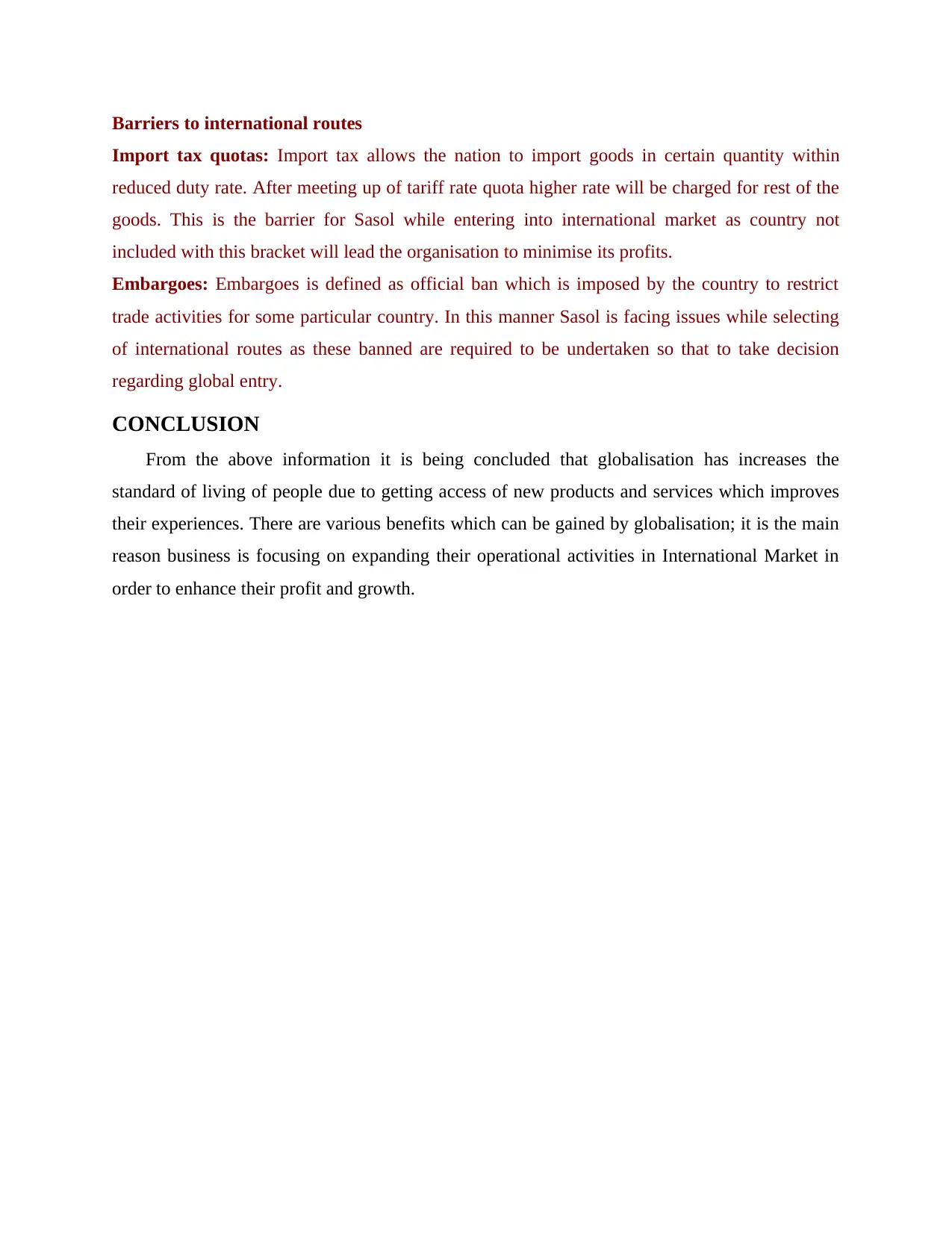
Barriers to international routes
Import tax quotas: Import tax allows the nation to import goods in certain quantity within
reduced duty rate. After meeting up of tariff rate quota higher rate will be charged for rest of the
goods. This is the barrier for Sasol while entering into international market as country not
included with this bracket will lead the organisation to minimise its profits.
Embargoes: Embargoes is defined as official ban which is imposed by the country to restrict
trade activities for some particular country. In this manner Sasol is facing issues while selecting
of international routes as these banned are required to be undertaken so that to take decision
regarding global entry.
CONCLUSION
From the above information it is being concluded that globalisation has increases the
standard of living of people due to getting access of new products and services which improves
their experiences. There are various benefits which can be gained by globalisation; it is the main
reason business is focusing on expanding their operational activities in International Market in
order to enhance their profit and growth.
Import tax quotas: Import tax allows the nation to import goods in certain quantity within
reduced duty rate. After meeting up of tariff rate quota higher rate will be charged for rest of the
goods. This is the barrier for Sasol while entering into international market as country not
included with this bracket will lead the organisation to minimise its profits.
Embargoes: Embargoes is defined as official ban which is imposed by the country to restrict
trade activities for some particular country. In this manner Sasol is facing issues while selecting
of international routes as these banned are required to be undertaken so that to take decision
regarding global entry.
CONCLUSION
From the above information it is being concluded that globalisation has increases the
standard of living of people due to getting access of new products and services which improves
their experiences. There are various benefits which can be gained by globalisation; it is the main
reason business is focusing on expanding their operational activities in International Market in
order to enhance their profit and growth.
⊘ This is a preview!⊘
Do you want full access?
Subscribe today to unlock all pages.

Trusted by 1+ million students worldwide
1 out of 13
Related Documents
Your All-in-One AI-Powered Toolkit for Academic Success.
+13062052269
info@desklib.com
Available 24*7 on WhatsApp / Email
![[object Object]](/_next/static/media/star-bottom.7253800d.svg)
Unlock your academic potential
Copyright © 2020–2026 A2Z Services. All Rights Reserved. Developed and managed by ZUCOL.




